Seville, Spain
 |
| View of Seville from Giralda Tower |
The Andalusia region of Spain is rich in history and
cultural tradition. It expresses dramatic changes in its geography and
illustrates varied cultural identities.

On our way to Seville we experienced the continually changing landscape first hand. In a mere 31 miles we saw the subtropical coast of the Province of Granada, the snow covered peaks of the Sierra Nevada Mountain range, and the Tabernas Desert (the only desert in all of Europe). Every moment of our six hour drive from Calpe to Seville was eye catching and left us in awe. Nearly 50% of this region is cultivated for agriculture.
 |
| Sierra Nevada Mountain Range |
The picturesque countryside is
blanketed with fields of wheat, sunflowers not yet in bloom, rows of corn, and
cotton. While the rolling hills and flat plains draw the eye into the distance
following endless rows of olive trees and wind turbines; creating renewable
energy for the region.
 |
| Plaza de Espana |
Seville is the 4
th largest city in Spain therefore we couldn't possibly see and learn about everything it has to offer in four days- nor could I fit it all into a blog format. So let me share with you the things we did learn and see including: the center of the city, a number of the Spanish plazas, Seville Cathedral, Giralda Tower, Casa de Pilatos, Alcazar, and a traditional Flamenco show.
 |
| La Macarena Wall |
Once we settled into our temporary home – a nice apartment we rented using AirBnB- we were determined to see the layout of the city while deciding what sights were worth revisiting for a closer look. Overwhelmed would be a good way to express our initial impression of Seville.

It was challenging
to stop myself from snapping pictures because every street, building, garden,
and corner offers excitement to our senses.
The beauty is endless in this city- not like others we have visited where you must track down the beautiful parts hidden beneath the litter and graffiti.
 |
| Wrought iron bars cover every window |
 |
| Sevillian Restaurant Decor |
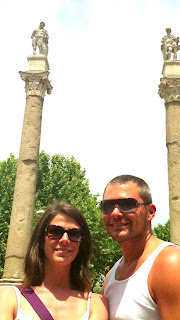 |
| Statues of Hercules & Julius Ceasar |
Seville is said to have been found by Hercules in Greek mythology but its historical fame began after Christopher Columbus returned from discovering America. 300 years as a shipping port to America made it the wealthiest and most influential region in all of Spain.
 |
| Cathedral Entrance |
 |
| Tomb of Christopher Columbus |
Inside the Cathedral we saw the tomb of Christopher Columbus’s which
houses his remains. Although this topic
has been widely debated in 2006 DNA testing was done and it was determined these
are the remains of Christopher himself.
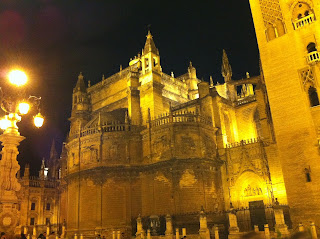 |
| Back of Cathedral |
The Cathedral’s construction began in 11
th
century as a Mosque built by the Moors but has evolved in architecture until
the 19
th Century. It is the
most extensive gothic cathedral found in the entire world. The Cathedral
Treasure, the High Altar, and the Giralda Bell Tower are
worth mentioning for their exquisite décor and spectacular views.
 |
| Giralda Bell Tower |

The Real Alcazar was built in the 14
th Century
and today is the oldest Royal residence still in use. This royal palace, known for its extensive gardens,
welcomed Christopher Columbus and was at one time home to King Ferdinand and
Queen Isabella.
 |
| Temple in Alcazar |
 |
| Mercury's Pool |
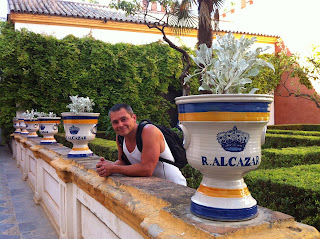 |
| Alcazar Garden |
 |
| Terrace overlooking the grounds |
 |
| The Bath in Alcazar |
We enjoyed Mercury's pool- filled with huge fish that had not
problem being petting or hand fed- the underground bath -which made us appreciate
hot water and indoor plumbing- and the Tapestry Room- housing tractor trailer
size hand sewn murals illustrating conquest and religious traditions.
 |
| Tapestry Room |
Flamenco and bullfighting originated in the Andalusia region.
Recently bullfighting interests have declined –taking a backseat to more
humane activities- while flamenco has grown to be an international sensation.
After experiencing a traditional flamenco show we understand its increase in
popularity.

The guitar music has an unmistakable rhythm, the dance is erotic
and strenuous, and the vocals are passionate and drawn out. We highly recommend
seeing a traditional flamenco show if you ever have the opportunity. Check out
the video clip below to see for yourself.
Our four days in Seville opened our eyes to Spain in a new
light. Seeing history and tradition amidst a modern functioning city was a delightful
treat. There never was a dull moment because there is so much to do and see. It
is close to beautiful mountains- for hiking/camping- it is only two hours from
the beach-, Africa is easily accessible if one is drawn to more exotic travel,
and it is only a few hours from Portugal. This is the first place we visited were we
could actually see ourselves living.
 Gibraltar
Gibraltar
The rock of Gibraltar has been called the “Pillar of Hercules” based on the legend of the creation of the Strait of Gibraltar in Greek mythology. There is evidence of Neanderthal habitation in between 128,000 and 24,000 BC based on artifacts found at Gorham's Cave, making Gibraltar the last known holdout of the Neanderthals. Today it is known simply as “The Rock.” It is densely populated with nearly 30,000 people – who call themselves Gibraltarians- living on only 2.6 square miles.
 |
| Cannon hole overlooking Spain from The Rock |
Throughout history it has been a desirable piece of land. It has faced a number of invasions but the most notable being the Great Siege of Gibraltar- an unsuccessful attempt by Spain and France to capture Gibraltar from Britain.
 |
| Siege Tunnels |
During WWII the rock was known as a British fortress offering the British military great protection as well as control of the entrance to Europe by land and by sea. Inside the Rock of Gibraltar itself, miles of tunnels were excavated from the limestone. Masses of rock were blasted out to build an "underground city". In huge man-made caverns, barracks, offices, and a fully equipped hospital were constructed. Today it is still an overseas British territory were oddly enough they drive on the right side of the road and not the left.
 |
| Narrow streets |
 |
| Full Coverage |
 |
| Thinking Macaque |
On the rock there are 500 species of flowering plants and at the top there is a nature reserve that is home to around 230 Barbary Macaques- the only wild population of monkeys found in Europe.
 |
| Chip Thief |
These moneys are not aggressive unless you have visible food. When we were driving into St. Michaels cave I had my car window rolled down. There was an empty bag of chips stuffed in the car door… all of the sudden a macaque jumped on the back of the car, ran across the roof, hung off the side mirror while coming inside the car to steal the chip bag. Unfortunately for him I had eaten all the chips but he gave me a rather unexpected scare.
We had planned on taking a cable car up the rock but due to bad winds this was not an option. It was so chilly that I wore a beach towel as a shaw to stay warm for the rest of the day.
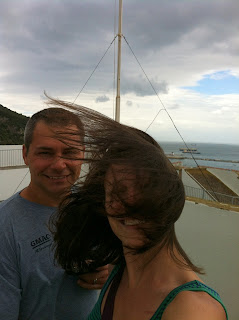 |
| Windy |
So we decided to drive up instead. Included in our ticket price- 13 Gibraltar pounds each- we could visit all the attractions the rock has to offer.

We began with St. Michaels Cave- a stalagmite and stalactite wonderland- that is used today as a concert hall because of its natural acoustics. As we toured the glorious cave we enjoyed the echoing sounds of classical music, staggered across a puddle ridden floor, and basked in the colored lights set to display the cave’s deepest corners.
 |
| Amphitheater Seating |
 |
| Sand Castles in the Sky |
 |
| Stalagmites & Stalactites grown to form a solid column |
 |
Look hard and you can see
Africa |
From there we hiked to the top of the rock with hopes of a clear view of Africa, but the weather did not work in our favor again. Instead we found the Mediterranean Steps- about 321 stairs down – making it 642 stairs when hiking to the bottom and back up which we did. The wind was less fierce on the Mediterranean side compared to the Atlantic side.

The views of Gibraltar were spectacular, the fauna was more colorful than a rainbow, and oldness radiated from the steps and the WWII bunkers along the hike. Once at the bottom we had a picnic lunch and watched the seagulls float on the wind. Just as we started to climb back up rain clouds joined us, the wind picked up, and we were greeted by a family of macaques- they must have smelled the PB&J we just ate.
 |
| Zoe & Joey taking a break |
 |
| Cave Exploration |
Once we made it back to the car we drove to the Siege Tunnels to do some inside exploring to get out of the rain. They were much more interesting than I originally expected because I am not war buff but the circumstances in which soldiers lived and worked in were rather impressive.
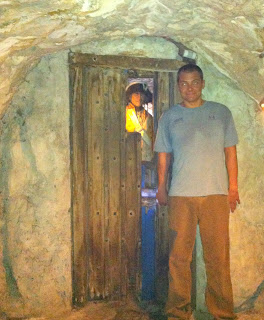 |
Scared the crap out of us because it yelled...
"Halt! Who goes there" as we passed by. |
 |
| Protected by War Curtains |
 |
Life of Siege Soldiers
|
 |
| Lighthouse at Europa Point |
Because of the bad weather we drove to sightsee around the rest of Gibraltar. We visited Europa Point, where the Mediterranean Sea and the Atlantic Ocean meet. This was another viewpoint in which we should have been able to see Africa but could not.
 |
| Mosque on the Mediterranean Sea |
 |
| 1st evidence of Courage family ties in Britain |
 |
| Casemates Square |
Before leaving to head back to Seville we made our way to Casemates Square and enjoyed a nice warm meal. Ross had been highly anticipating British fish and chips and he most definitely was not disappointed.
 |
| Fish & Chip served with Mushy Peas |









































 The views of Gibraltar were spectacular, the fauna was more colorful than a rainbow, and oldness radiated from the steps and the WWII bunkers along the hike. Once at the bottom we had a picnic lunch and watched the seagulls float on the wind. Just as we started to climb back up rain clouds joined us, the wind picked up, and we were greeted by a family of macaques- they must have smelled the PB&J we just ate.
The views of Gibraltar were spectacular, the fauna was more colorful than a rainbow, and oldness radiated from the steps and the WWII bunkers along the hike. Once at the bottom we had a picnic lunch and watched the seagulls float on the wind. Just as we started to climb back up rain clouds joined us, the wind picked up, and we were greeted by a family of macaques- they must have smelled the PB&J we just ate. 
























3 comments:
Hi aunt McRae I got your email love you guys
I am studded by all the breath taking pictures you'll have posted. I am so jealous, in a good way. makes me want t o see the world some day soon! you know me I love water reflections and the one with bath was amazing. I miss you both and can not wait to see you'll, but until then know that you are in in spirit every where I go! love you keep taking those beautiful pictures of your adventures!
Your pictures are absolutely beautiful....Jerry and I have so enjoyed reading your blogs and living through your adventures! Wow...how sad that no one said anything to that kid that was throwing rocks at the sting ray (except for you all). Always amazes me at the cruelty of some people with no guilt about it at all. I love the fact that you both enjoy the beauty of nature....I was always taught to respect it and to actually see the veins in the leaves and the bark on the trees....love you guys!!!!
Jerry and Penny
Post a Comment